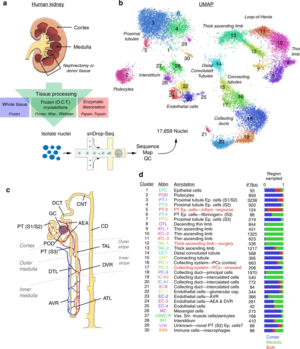Sanjay Jain, MD, PhD, Associate Professor of Medicine, Division of Nephrology, is co-PI of a newly awarded Human BioMolecular Atlas Program (HuBMAP) grant for generation of a single cell and 3D molecular atlas of the urinary system.
The HuBMAP program, funded through the NIH Common Fund, aims to develop an open, global framework that supports the research community efforts to map the adult human body at the level of individual cells. The establishment of a “census” of cells in human tissues will allow the study of the relationship between cellular organization and function, and determine the variability in normal tissue organization at the level of individual cells.
Dr. Jain, director of the WU Kidney Translational Research Center, is part of a multi-PI team that will generate single cell and multiplexed 3D epigenetic, transcriptomic and protein expression data from the urinary tract and the lungs. The team consists of collaborating PIs from UCSD, UNC, Harvard and Washington University.
Jain will generate data from reference human tissue from the bladder, ureter and the kidneys. The bladder, ureter and kidney (BUK) mapping center (BUKMAP) will generate 3D, high resolution, high content, organizational maps of the epigenome, transcriptome and proteins in the extracellular space in individual cells of the adult non-diseased human kidney and lower urinary tract.
This comprehensive approach will provide fundamental insights about the molecular organization of key structures and physiology of organs at an unprecedented level of precision. It is a major step towards understanding the functions and malfunctions of these organs
Jain is a previous recipient of a grant from the Kidney Precision Medicine Project (KPMP), an ambitious project funded by the NIDDK with the purpose of understanding and finding new ways to treat chronic kidney disease (CKD) and acute kidney injury (AKI). The multi-PI team of Jain and Dr. Kun Zhang, Chair/Professor of Bioengineering at UCSD, aims to generate single nucleus and 3D multiplexed transcriptomic data from healthy and diseased human kidney tissue including biopsies from patients with acute kidney injury (AKI) and CKD.
One of the objectives of their effort was to establish robust tissue processing and analytical pipelines for generating a single cell gene expression atlas from a limited amount of tissue with negligible artifacts and in a manner that is economical on scale and allows interrogation of the tissue by multiomics technologies. Their first manuscript to deliver on this goal, “A single-nucleus RNA-sequencing pipeline to decipher the molecular anatomy and pathophysiology of human kidneys,” was just published in Nature Communications.

Single-nucleus RNA-seq interrogation of the human kidney; Figure 1, Nature Communications
Using single-nucleus Droplet-based RNA sequencing (snDrop-Seq), they resolved 30 distinct cell populations in human adult kidney and defined molecular transition states along more than ten nephron segments spanning two major kidney regions. They further delineated cell type-specific expression of genes associated with chronic kidney disease, diabetes and hypertension, providing insight into possible targeted therapies.
Coauthors from WU include Dr. Anitha Vijayan, Dr. Masato Hoshi, Diane Salamon and Amanda Knoten, (Nephrology), Dr. J Gaut (Pathology & Immunology), and Drs. Eric Kim and Ramakrishnan Venkatesh (Urology). Read the full article here.
See the Jain Laboratory website for more information about Sanjay Jain’s exciting research.
